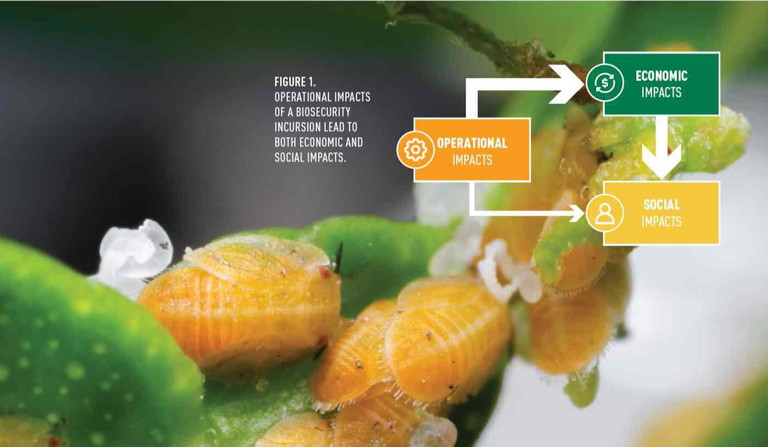Beating biosecurity incursions

BY HELEN NEWMAN
BIOSECURITY OFFICER,
WA CITRUS
Being prepared, communication and a shared responsibility between business operators, industry and government are key to business continuity during a biosecurity event.
When an incursion of an emergency or high-priority plant pest occurs, it can have devastating consequences – both financial and personal – for business owners and staff. Uncertainty in the early stages of an incursion is generally unavoidable due to the many initial unknowns, even among experts, about the pest type, origin and spread.
However, strong communication between authorities, industry bodies and growers early in the incursion can help alleviate uncertainties and support practical action at farm-level. Well-prepared business continuity and biosecurity plans that are understood by everyone in the business bring further certainties and can make the road to recovery smoother.
Below is a summary of the key findings and recommendations from a Hort Innovation funded project (NY18010) delivered by the Nursery & Garden Industry Queensland that assessed the type of economic and social impacts that occur as a result of a biosecurity incursion on a production nursery. Findings are relevant to all.
Impacts of an incursion
Through a series of interviews with nursery industry representatives, researchers were able to identify and broadly categorise potential impacts of biosecurity incursions on industry and business resilience.
A flow in how the impacts were felt by industry was noted, with operational impacts leading to both economic and social impacts, and economic impacts leading to social impacts (see Figure 1).

“ Strong communication between authorities, industry bodies and growers early in the incursion can help alleviate uncertainties and support practical action at farm-level. ”

“ Well-prepared business continuity and biosecurity plans that are understood by everyone in the business bring further certainties and can make the road to recovery smoother. ”
Operation impacts
Operational impacts are the additional actions that a business must undertake during an incursion response. They may include:
• Movement restrictions
• Surveillance tasks
• New or additional pest control or biosecurity procedures
• Additional administration tasks
• Isolation or quarantine of stock
• Disposal or destruction of stock
Economic impacts
These impacts arise from operational impacts and can include:
• Increased costs
• Increased workload requirements
• Stock destruction (tree destruction in the case of orchards)
• Restricted or reduced trade
• Reduced value of stock
Social impacts
There are four main types of social impact experienced by growers, they are:
• Increased work demands of managing a business during the incursion response
• Financial implications of the incursion for the business
• Conditions of high uncertainty about the incursion and its implications
• Difficulties in social relations with government authorities and other nursery businesses
Top 8 grower tips
Your guide to managing an incursion.
1 Prioritise being prepared for the event of a biosecurity incursion.
2 Use industry and farm preparedness resources such as the Biosecurity Manual for Citrus Producers (national manual available through the PHA website) and resources on the Farm Biosecurity website www.farmbiosecurity.com.au.
3 Undertake your own biosecurity incursion scenario exercise/s to ensure you have thought through likely impacts and therefore what you need to do to be prepared. Diversifying into different markets during an incursion is often extremely difficult or impractical, you need to consider how you would access alternative income streams and/or sources of credit if the incursion is prolonged.
4 Ensure you are regularly updated on important industry news and alerts by subscribing to relevant industry newsletters and Biosecurity Alerts.
5 Maintain regular communication with industry personnel, including advising them when you are affected by a biosecurity incursion.
6 Ensure you can readily access business records that are relevant to a biosecurity investigation to provide key data to authorities in the event of an incursion.
7 Proactively foster relationships with key industry and government personnel, and other growers, who may have expert knowledge and/or experience with biosecurity management, to provide helpful information in the event of an incursion.
8 Prepare for unknown and uncertain impacts, for example by identifying alternative suppliers.
3 key steps to success
1 Being prepared is a priority activity for business owners to ensure continuity.
2 Communication is critical to a timely response and return to trade.
3 Business operators, industry and government have a shared responsibility to focus on preparation activities and improve system-level incursion preparedness.
MORE INFORMATION
Contact Helen Newman on biosecurity@wacitrus.com.au.
